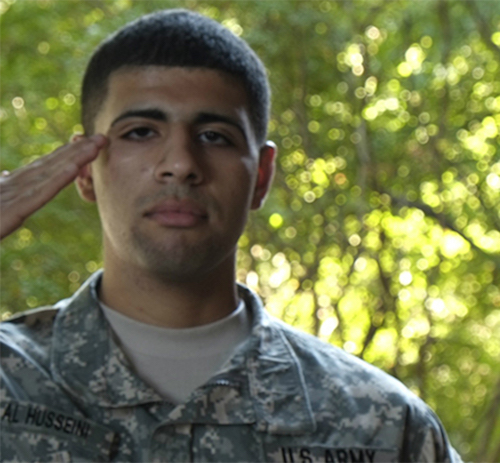Mahdi Al Husseini of Douglasville, Georgia, joined Army ROTC in 2014. He will graduate in Spring 2018 with degrees in Public Policy and Biomedical Engineering. Army officers each receive a commission into a particular branch of the Army, and Al Husseini will learn which branch of the Army he will be assigned to in mid-November.
 Why did you join ROTC?
Why did you join ROTC?
I see public service, whether on the local or national level, as a personal obligation. I constantly reflect on the support network I have been blessed with, and regularly ask myself if I have given back to the people and institutions that have allowed me to succeed. Joining ROTC, and by extension, later the Army, was one such way to give back.
What do you expect to get from your military experience?
I have always believed an easy life isn’t a great life — a great life is a meaningful life. Sometimes the most meaningful experiences are gritty, painful, stressful, and terrifying. The Army provides fertile ground for such experiences.
It is a remarkable thing that a team of individuals can do so much more than the combination of their individual tasks. That kind of power changes the world.
What is your personal philosophy of leadership?
I am firm in my expectations, but relaxed in how I delegate the execution. I fundamentally believe that, with the proper guidance, people can and will find ways to surprise you.
Trusting subordinates allows for an efficient split of responsibility, and encourages each team-member to take agency over the mission. I am a fan of the gestalt principle: the whole is more valuable than the sum of its parts. It is a remarkable thing that a team of individuals can do so much more than the combination of their individual tasks. That kind of power changes the world.
How have your experiences in ROTC and Tech helped shape that philosophy?
In ROTC, we often practice in squads and platoons to conduct successful battle-drills against an opposing force. Having double-majored at Georgia Tech, I have the unique opportunity, for good or for bad, of participating in the Capstone Design Expo twice. In the School of Public Policy and the Biomedical Engineering Department, students work in groups to draft legislation or develop medical devices, respectively. To see the potential of a well-guided team at Georgia Tech, simply stroll around the Capstone Expo at semester's end. The projects are inspiring, and represent the best of both leadership and Georgia Tech.
What have you learned that you might not have otherwise learned had you not chosen this path?
Life, as opposed to academics, quickly pitches us ethical dilemmas without correct answers. Learning to select the best of the available options, and then being confident in that made decision, is valuable but does not come easy. Sometimes we are only faced with poor choices, and yet must select one and live with the consequences. In these instances, rarely is there time to ponder and weigh the options. The best preparation is to know yourself and your values.
What has surprised you about ROTC and the process of learning to become an officer?
What surprised me most about ROTC is the extent to which cadets are empowered to change the program. Though ROTC is officially managed by cadre, many if not most of the ROTC tasks and programs are cadet-driven. In this sense, ROTC serves as an excellent sandbox for up and coming officers.
What advice do you have for those coming behind you considering ROTC?
It is important to remember that ROTC is a training program for future officers, and is therefore a means to an end. Your experiences in ROTC will not resemble your experiences in the larger Army, though you will certainly be more prepared for the latter as a result.
Additionally, before signing with a recruiter, talk your decision over with close friends and family. Even if your mind is made up, speaking your intentions aloud with loved ones can help strengthen your resolve one way or the other.
